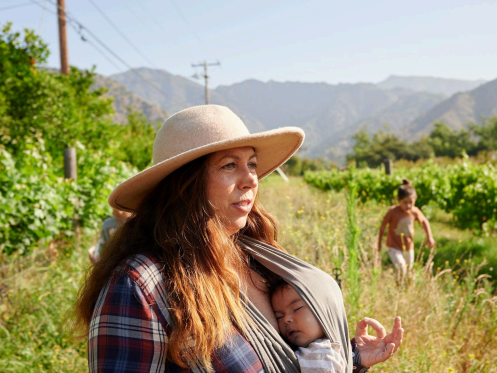- Mollie Englehart announced last month that her once-vegan restaurants would sell meat, dairy, and eggs.
- Englehart's move from veganism to regenerative farming was condemned by animal rights activists.
- She told BI the market is saturated with vegan options, making purely vegan restaurants obsolete.
This as-told-to essay is based on a conversation with Mollie Englehart, executive chef at Sage Regenerative Kitchen & Brewery in California.
Last month, Englehart announced that her restaurants, which were called Sage Vegan Bistro, would now offer meat, dairy, and eggs to customers. The move sparked a backlash.
This conversation has been edited for length and clarity.
I identify with all those people who are upset with me right now about shifting away from an all-plant-based menu, and I understand their upset. I was once them.
The animal activists have no choice but to tear down what I'm saying because I'm pushing up against their position in the world.
When I first started to have these realizations that went against my bias as a lifelong card-carrying plant-based person, I was also upset, angry, and frustrated.
I had also been living under the illusion that eating a vegetarian or vegan diet did less harm to the world.
But there was definitely, definitely naivety in my past position.
I've since changed my mind, and it's OK to say I believed one thing in my 20s and 30s and something else in my 40s.
Now, I'm backing regenerative agriculture.
'You can't have a farm without death'
If you cannot find a righteous source of dairy or meat where you know those farmers' practices, I still believe it's better not to eat meat.
But years ago, I got my own farm. That was the beginning of this journey.
Through farming and other events, I realized that you can't have a farm without death.

I previously thought I could have a utopian sanctuary-type farm where no animals die, but I was wrong.
My sheep got killed by a neighbor's dog; others were injured beyond repair.
My husband and I were so upset, but he took them out of their suffering, and we harvested the meat and distributed it around the community.
I remember thinking: Wow, that's honoring their life, maybe more than just me crying and being upset that my sheep were dead.
Then, I had another incident where I'd just gotten these new young female ducks.
We never killed any ducks on our farm, so we had all these drakes. Overnight, the drakes raped and killed all except three of the 19 female ducks.
All those girls suffered because I was unwilling to cull any male ducks.
My mindset was such that a farm could exist without death. But, in reality, this is impossible.
Regenerative agriculture over veganism
I'm a logical business person, so regenerative agriculture started to feel like a more scalable path forward that is better for the animals.
If we're not putting soil health at the front of what we're committed to, then we're not putting humanity and animal health at the front of what we're committed to.
People will say, "How is better? You're going to kill the animals in the end."
Yes, we're all going to die in the end, but the quality of life matters; how much suffering there is matters.
I want to give meat-eaters an opportunity to purchase meat at a restaurant that comes from cleaner, healthier, better sources.
That doesn't really exist right now, and I feel like that is a wide-open space for me to move into.
'The idea of a strictly vegan restaurant may now be too narrow'
I know many people just want to say this transition is just for greed or money, but nobody went into farming or restaurants because they wanted to make easy money.
They're two of the hardest businesses.
I've closed two stores; Cafe Gratitude has closed stores, and Nic's On Beverly has closed. Many, many vegan places are closing.

I think the market is very diluted at this point because everyone has a vegan option.
It's almost like everybody adding a vegan option makes the vegan restaurant obsolete because there's no need for it.
You can go to big chains, everywhere from Burger King to BJ's to Claim Jumper, and there will be vegan options. So the idea of a strictly vegan restaurant may now be too narrow of a business.
It's not just an epidemic of vegan restaurants closing; I think for restaurants post-pandemic, it was generally really hard to recover.
I've sold many items to keep my restaurants afloat at this point. I have not been paid in more than a year from my restaurants. I've gone above and beyond to keep my employees employed and my business going.
So, of course, there's a financial component.
But the question is, am I doing this for money, or am I no longer afraid because there's nothing to lose?
This aligns with my highest belief at this moment in my life, and I have nothing to lose. The writing was on the wall.
This is my best foot forward for my family, the environment, the microbiology of all of us, my employees, and my customers, whether they know it or not.
